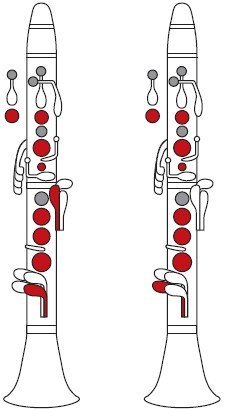If there is a scale that feels like late-night city lights reflected on wet pavement, it is the F minor scale (natural) on the Bb clarinet. It sits perfectly in that space between sorrow and strength, where every note feels like it is holding back a story you are just about to tell.

Receive a free PDF of the chart with clarinet fingering diagrams for every note!
The F minor scale (natural) on Bb clarinet is an expressive scale built on concert Eb, using four flats and a dark, melancholic color. It trains your ear for minor sonorities, deepens phrasing control, and prepares you for classical, jazz, and film music that leans into intense emotion.
The F Minor Mood: Why This Scale Grabs Your Heart
The first time many players really hear the F minor scale, it is not from a fingering chart. It is from a moment in a piece where the room suddenly feels heavier: a Brahms clarinet sonata phrase, a smoky Benny Goodman ballad, or a film score that quietly shifts from hope to doubt. F minor has that color that makes vibrato on a throat tone feel suddenly necessary, that makes a long-tone on low F sound like a confession.
On Bb clarinet, the natural F minor scale lines up with concert Eb minor, which composers love when they want warmth in the strings and a velvety cushion in the horns. Sliding through those notes with a focused embouchure and relaxed right-hand pinky feels almost vocal. It is as if your clarinet reed is humming an old song everyone has heard before but cannot quite name.
F minor (natural) on Bb clarinet corresponds to concert Eb minor, which uses Ab, Bb, Db, and Eb. Learning to hear and feel these four flats stabilizes your intonation and prepares you for darker orchestral and jazz keys.
From Stadler To Film Scores: A Short History In F Minor
Even before the modern Boehm-system clarinet, minor scales like F minor were the emotional laboratory for early clarinet pioneers. Anton Stadler, the clarinetist who inspired Mozart, spent his life shaping legato and intonation on wooden instruments with far fewer keys and far more resistance. When he practiced minor scales, he was training the instrument to sing like a voice, not just bark like a military signal.
By the time Heinrich Baermann was dazzling audiences in the early 19th century, the clarinet had more keys, wider dynamic range, and composers like Carl Maria von Weber were writing concertos that stretched the instrument in every direction. Weber often drifts toward minor tonalities that feel incredibly close to F minor in color: stormy, lyrical, a little dangerous. Practicing your F minor scale gives you direct access to that Weber sound, especially in the low register where his clarinet concertos burn the brightest.
Fast forward to Johannes Brahms working with Richard Mühlfeld in the late 19th century. Brahms loved deep, autumnal shades, and many of his clarinet phrases lean into minor inflections that live just a half step or two away from F minor. The way Mühlfeld could turn a simple minor scale into a full line of speech helped Brahms hear the clarinet not as a bright obbligato voice, but as a storyteller equal to the cello and piano.
Clarinet Legends Who Live Inside This Scale
Listen to Sabine Meyer play the Brahms Clarinet Quintet and you will hear why the F minor scale matters. She often leans on scale fragments that mirror the natural F minor shape: stepwise sighs, slow motion descents, and those stretching intervals above low F and Ab. Her tone has this glassy core, and you can almost feel the long hours she poured into slow minor scales with the metronome barely ticking.
Martin Frost, with his theatrical stage presence and almost vocal phrasing, treats minor keys like character studies. When he plays pieces by Anders Hillborg or Kalevi Aho, you often hear icy, whisper-soft lines that hover around the same pitches as the F minor scale. He pushes dynamics from barely audible to full-throated in one breath. That sort of control is born from scales, especially the brooding ones.
Jazz players found a different way into F minor. Benny Goodman loved minor-key ballads and modal tunes. In slow pieces where the band rests on a concert Eb minor harmony, he would weave through what Bb clarinetists experience as F minor: bending up from low F with subtle pitch inflection, ghosting the third of the chord, and sliding through chromatic neighbors that still orbit the scale. Artie Shaw, on records like “Nightmare” and his arrangements of dark swing tunes, used minor scales to pour blues color into classical-style technique.
Buddy DeFranco took bebop language and dropped it into minor keys with fearless clarity. His clean, rapid tonguing and left-hand ring finger agility make fast F minor runs sound almost easy. Underneath that fluency is a lifetime of scale practice, where the natural minor is the starting point before adding blues notes and altered tensions.
In the klezmer tradition, Giora Feidman and David Krakauer both draw on modes that often sit right next to F minor in pitch content. Listen to their clarinet lines: wide leaps, wails around the Ab and Bb, and long sustains on scale tones that feel like questions. Even when the exact scale is slightly different, the emotional fingerprint feels close to F minor: yearning, bittersweet, both grounded and restless.
Iconic Pieces And Recordings That Echo F Minor
On the classical side, think of Mozart's Clarinet Concerto and Clarinet Quintet. They are in A major, but Mozart constantly brushes past minor colors, and if you transpose the feeling into F minor on Bb clarinet, you get that same mix of light and shadow. Practicing your F minor scale helps you phrase those darker turns in Mozart with more honesty and less guesswork.
Weber's Concertino and first Clarinet Concerto are lined with stormy episodes and orchestral tuttis that feel right at home beside F minor. Those fast arpeggios and leaps from low F up to high C or D might not be strictly labeled F minor in the score, but if your fingers know the scale cold, those passages stop feeling like landmines and start feeling like sentences you already know how to speak.
Brahms Chamber music is soaked in minor color, and clarinetists often practice scales like F minor specifically to bring weight to works such as the Clarinet Sonatas in F minor and Eb major. The first sonata lives directly in F minor on the Bb clarinet. If you listen to recordings by Karl Leister or Sharon Kam, notice how every time the melody leans into the minor third and sixth, it sounds lived in. That sound comes from years of minor scale work.
In the 20th century, Richard Stoltzman brought a singing, almost vocal-pop sensibility to classical clarinet. On his recordings of Aaron Copland's Clarinet Concerto and Leonard Bernstein's pieces, the minor passages glow with this elastic, slightly jazzy phrasing. He treats a simple F minor scale fragment like a spoken sentence with punctuation and emphasis, not just a line of equal notes.
Film composers lean on the F minor color constantly. Think of the kind of scenes scored by Howard Shore in the darker corners of “The Lord of the Rings,” or the hushed suspense of a John Williams cue before a big reveal. String sections might carry the main line, but every clarinetist sitting in a major orchestra knows that scale color. Practicing the natural F minor scale gives you the vocabulary to blend into those cinematic shadows without fighting the key.
| Piece | Composer | How F minor shows up |
|---|---|---|
| Clarinet Sonata in F minor, Op. 120 No. 1 | Johannes Brahms | Directly uses the F minor scale on Bb clarinet, especially in long, lyrical phrases. |
| Weber Clarinet Concerto No. 1 | Carl Maria von Weber | Passages echo F minor scale shapes in low and middle registers. |
| Klezmer improvisations | Giora Feidman, David Krakauer | Use modes that orbit around F minor pitch patterns and expressive bends. |
How The F Minor Scale Feels Under The Fingers
Set aside the metronome for a moment. Take a good reed, maybe a Vandoren 3 or a D'Addario Reserve, and just let your fingers trace the F minor scale slowly. Low F under the right-hand pinky, moving to G, Ab, Bb, C, Db, Eb, and then back to F. Feel how the left-hand position stays calm while the right hand does most of the color work.
The natural F minor scale on Bb clarinet is friendly for the chalumeau and clarion registers, but it asks for focus around Ab and Db so that they speak clearly. The fingering chart gives you the exact combinations, but what really matters is the way the throat tones blend into the long tube of the instrument. If you keep your air moving like a singer on one long phrase, you will hear how the scale starts to sound less like an exercise and more like a melody waiting for words.
| Register | Notes of F natural minor | Feel on Bb clarinet |
|---|---|---|
| Low (chalumeau) | F to Eb | Dark, woody, perfect for Brahms and moody film cues. |
| Middle (clarion) | F' to Eb' | Singing and flexible, ideal for lyrical solos. |
| High (altissimo) | F” and above | Intense and bright, adds drama in modern pieces. |
Simple Practice Routines To Make F Minor Sing
You do not need hours each day to let the F minor scale reshape your sound. What you need is a small, steady ritual that you actually look forward to. Think of it like brewing coffee: not a big project, just a daily flavor that your fingers and ears start to crave.
| Routine | Time | Focus |
|---|---|---|
| Slow F minor scale, 2 octaves up and down | 5 minutes | Even air, legato tongue, centered pitch on Ab and Db. |
| Broken thirds in F minor | 5 minutes | Finger coordination, clean shifts between chalumeau and clarion. |
| Improvise a short melody in F minor | 5 minutes | Expression, dynamics, vibrato and phrasing ideas. |
- Play the F minor scale slowly at quarter note = 60, focusing on tone.
- Add dynamic shapes: start soft on low F, grow to a warm mezzo forte at the top, then fade.
- Practice the scale in slurred triplets, then gently tongued eighth notes.
- Finish by inventing a 4 bar melody using only the F minor notes.
Common F Minor Challenges And How To Soften Them
Every scale has its tricky corners. For F minor on Bb clarinet, the usual culprits are stuffy low F, unfocused Ab, and awkward side-key combinations for Db and Eb when moving quickly. The good news is that those challenges are exactly what make this scale such a powerful teacher of control and color.
| Problem | Likely cause | Quick fix |
|---|---|---|
| Low F sounds thin or airy | Weak air support and loose embouchure | Push more steady air from the diaphragm and firm the lower lip slightly. |
| Ab and Db sound unstable | Unsettled left-hand position or tension in ring fingers | Practice slow, repeated shifts around those notes while watching hand position. |
| Scale breaks between chalumeau and clarion | Tongue and air not coordinated in the register key change | Keep the air continuous and lighten the tongue touch when crossing the break. |
Why The F Minor Scale Matters For Your Playing
Learning the F minor scale (natural) is not about pleasing a teacher or filling a box on a syllabus. It is about gaining access to a color that composers keep returning to. If you want Brahms to sound like Brahms, or klezmer to ache the way it should, or your jazz ballad solo to feel honest, this scale gives you the vocabulary.
Working in F minor sharpens your ear for pitch because the flats sit just close enough to familiar notes to tempt you into playing them carelessly. It strengthens your right hand on low F, your ring fingers on Ab and Db, and your control of long phrases across the register key. Most of all, it teaches you to treat a simple line of notes as a story with a beginning, a turning point, and a quiet goodbye.
Once you feel comfortable with the F minor scale on Bb clarinet, the doors open to learning related keys, playing etudes that use rich minor colors, and enjoying orchestral parts without that little jolt of fear when you see four flats. It becomes just another neighborhood you know how to walk through, even at night.
Key Takeaways
- Use the F minor scale (natural) to shape a darker, more expressive clarinet tone in chalumeau and clarion registers.
- Listen to Brahms, Weber, jazz ballads, and klezmer recordings to hear how masters turn F minor into real musical speech.
- Practice short, daily F minor routines with dynamics and phrasing so the scale feels like a melody, not just an exercise.
Frequently Asked Questions
What is Bb clarinet F minor scale (natural) fingering?
The Bb clarinet F minor scale (natural) fingering is the sequence of finger patterns that produces F, G, Ab, Bb, C, Db, Eb, and F across one or more octaves. It uses four flats and emphasizes low F and Ab. Mastering this fingering improves tone, flexibility, and control in darker musical passages.
Why does the F minor scale feel so dark on clarinet?
The F minor scale feels dark because of its lowered third, sixth, and seventh degrees, which your ear reads as sadness or tension. On Bb clarinet, those notes sit in rich chalumeau and clarion registers, especially low F and Ab, giving the scale a woody, vocal quality that naturally suggests sorrowful or introspective moods.
Which clarinet pieces should I practice with F minor?
Start with the Brahms Clarinet Sonata in F minor, then look at Weber concerto passages and etudes by Rose or Baermann that use four flats. You can also adapt simple melodies into F minor, like folk songs or jazz ballads, to feel how the scale changes the emotional color of lines you already know.
How often should I practice the F minor scale?
Five to ten focused minutes a day is enough to make steady progress. Include one slow 2 octave version, some broken intervals, and a short improvisation. Consistent daily work is more effective than rare, long practice sessions, and it lets the sound of F minor settle naturally into your ear and fingers.
What is the difference between natural and harmonic F minor?
The natural F minor scale uses Eb as the seventh degree, keeping all four flats consistent. The harmonic F minor scale raises that Eb to E natural, creating a larger step between Db and E. On Bb clarinet, natural minor feels smoother and more lyrical, while harmonic minor adds a sharper, more dramatic flavor.
For more scale stories, fingering tips, and historical clarinet curiosities, you can also check related guides on Bb clarinet scales, minor key practice, and Martin Freres historical clarinets on MartinFreres.net.






